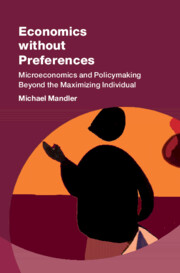Book contents
- Frontmatter
- Contents
- Figures
- Preface
- 1 Introduction: Marginal Utility Matters
- Part I Trade-Offs and Rationality
- 2 The Rise and Fall of Utility as an Ordering Principle
- 3 Incomplete Preferences, Global and Local
- 4 The Rationality of Choice
- 5 Safety Bias
- 6 The Myth of the Indifference Curve
- Part II Economic Analysis and Policy Without Preferences
- Appendix
- Bibliography
- Index
3 - Incomplete Preferences, Global and Local
from Part I - Trade-Offs and Rationality
Published online by Cambridge University Press: 02 January 2025
- Frontmatter
- Contents
- Figures
- Preface
- 1 Introduction: Marginal Utility Matters
- Part I Trade-Offs and Rationality
- 2 The Rise and Fall of Utility as an Ordering Principle
- 3 Incomplete Preferences, Global and Local
- 4 The Rationality of Choice
- 5 Safety Bias
- 6 The Myth of the Indifference Curve
- Part II Economic Analysis and Policy Without Preferences
- Appendix
- Bibliography
- Index
Summary
Preferences are incomplete when agents cannot rank some of their options. Incompleteness can arise when individuals believe that multiple utility functions or preference relations are reasonable ways to make decisions. When these potential preferences conflict, an agent will fail to come to a bottom-line judgment. Faced with such conflicts, agents can still specify the options preferred to some reference point but that set will be kinked at that point. Agents will therefore fail to have well-defined marginal valuations for goods: they will sacrifice a unit of a good only when offered a large amount of another good in exchange. The chapter also presents a more abstract model of incomplete preferences that begins with kinks in preferred sets of options rather than deriving them from a multiplicity of potential preferences. Indecisiveness and kinks also appear in decision theory when agents are unable to identify unique subjective probabilities.
Keywords
- Type
- Chapter
- Information
- Economics without PreferencesMicroeconomics and Policymaking Beyond the Maximizing Individual, pp. 43 - 58Publisher: Cambridge University PressPrint publication year: 2025

